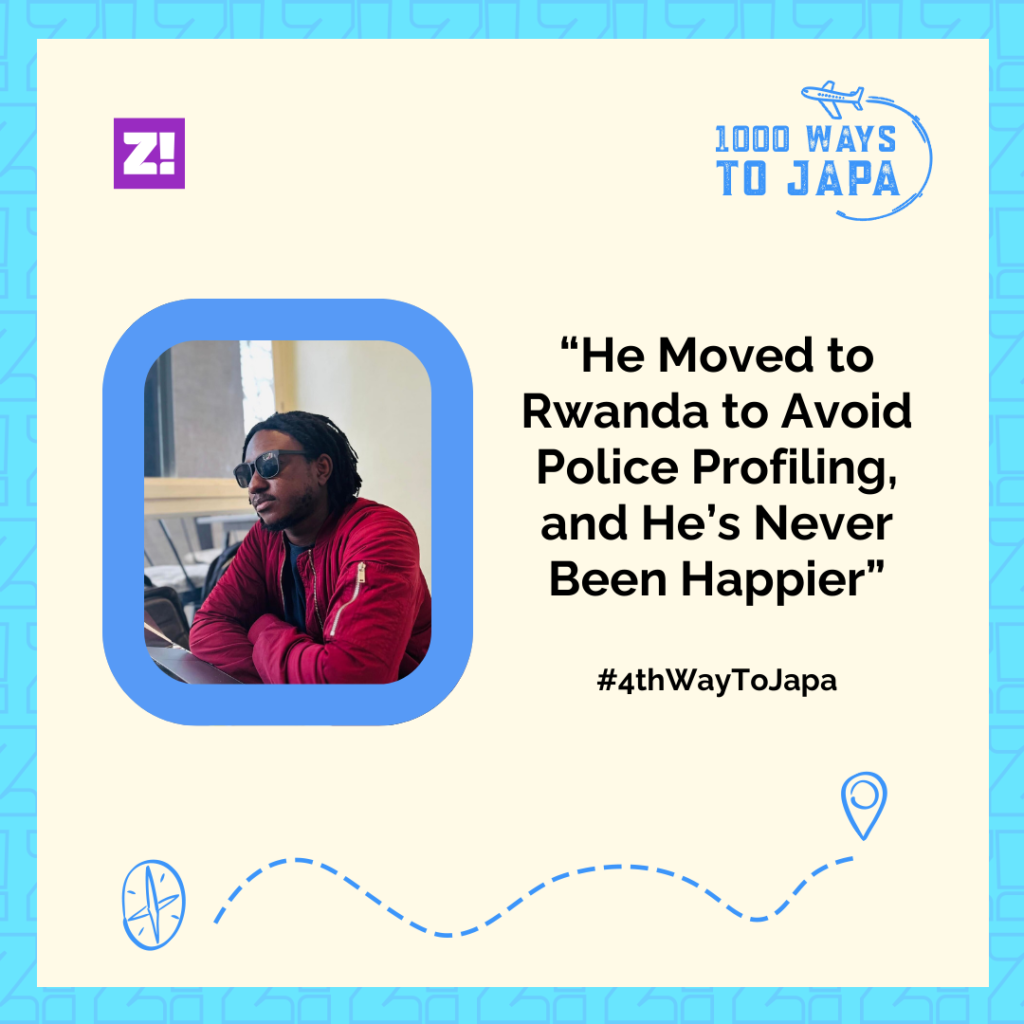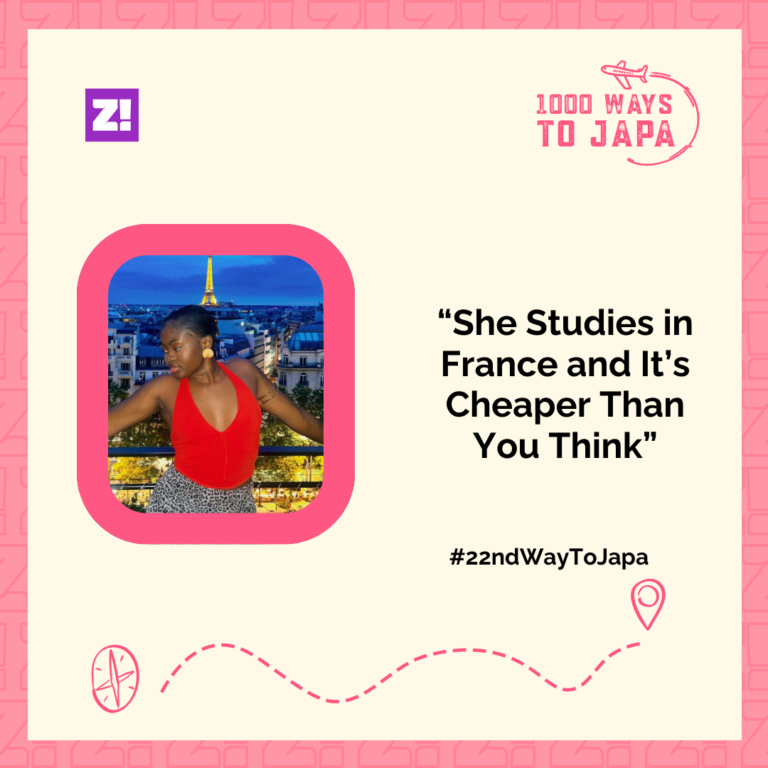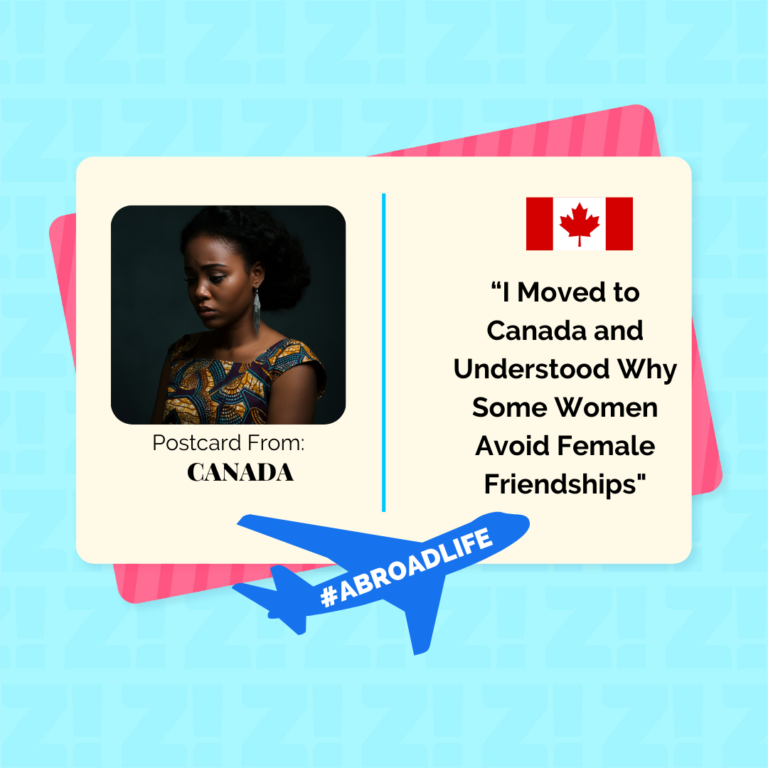Someone you know has left or is planning to leave. 1,000 Ways To Japa will speak to real people and explore the infinite number of reasons and paths they use to get to Japa.
Daniels James, the subject of this week’s 1,000 Ways to Japa, had plans to move to Dubai, but the universe redirected his steps to Rwanda. He tells us how a journey that was only supposed to last for a few months is starting to feel more permanent.

When did you move out of Nigeria, and where do you currently live?
I moved out of Nigeria in 2022, and I’m currently in Rwanda.
Why did you leave Nigeria for Rwanda?
So I was initially supposed to move to Dubai. That was my plan, majorly because I’m into marketing and tech in general–I felt like it was the best and easiest place for me to migrate to, but the day I started processing the visa was the same day they placed that ban on Nigerians. A friend of mine suggested moving to Rwanda, and I remember doing research about the country a few months before the Dubai ban, so I was like, okay, fine. I did a little bit of research on how to move, and I found out that it was quite easy. I made plans to stay there for a few months until the Dubai ban is lifted. The “few months” is now over two years.
LOL. Why did a few months become two years?
So the reason is that I feel like, if you stay in Rwanda, you’ll get really comfortable; that was what happened to me. Rwanda is a very chill place, so I naturally love it because I’m not someone who likes noise, even when I was in Nigeria. I’ve actually never been to Lagos; it’s too crowded and noisy for me. I would rather stay in Abuja than go to a place like Lagos. Rwanda gives me the Abuja vibe because it’s very chill, you hardly hear noises, and everything is peaceful. It’s also neat, and you don’t have all these police issues.
I’ve heard of other African countries where Nigerians get profiled on the street, but as far as you mind your business here, you’ll be safe. Plus, at that time. we didn’t have unlimited internet in Nigeria. Rwanda has 24/7 electricity and great internet access, so I felt like it was better to stay in Rwanda than remain in Nigeria. I believe that one of the reasons I have stayed here this long is because I got a little bit too comfortable in the country.
What did your life look like in Nigeria before you moved to Rwanda?
I lived in Abuja, but I’m originally from Benue, state. My place in Abuja was a serviced apartment–there was steady electricity for the most part, but since it’s Nigeria, there were bound to be a few hiccups. Plus, I was spending so much on data subscriptions. It wasn’t a bad life, but I wanted more.
In Nigeria, I walked around with a constant fear of police officers. I knew I could be easily profiled either because of my dreads or my iPhone. But I think the moment I really decided to leave Nigeria was when some police officers in Abuja extorted me. They returned my money the following day, but the experience left me with a fear that I’ll always need to watch my back so that I don’t get profiled by them. That’s not a good way to live, so I knew I had to leave the country.
Is life in Rwanda any different?
So in Rwanda, things are more expensive, but that’s something that comes with leaving Nigeria. Rent is way more expensive here, and they charge monthly for it. If you’re looking for an apartment here, you should budget $500 and above for a furnished one; It’s expensive, but I think it’s worth it, considering the level of peace that comes with living in Rwanda.
One time, I met with some of my Nigerian friends met up for coffee and I left the cafe at around 1 am. I was holding my MacBook in my hand because I didn’t go to the cafe with a bag; I saw police officers on the way home, but nobody stopped me and was not scared of getting robbed that day, the same way I’ve never had to worry about being robbed since I came to Rwanda. The chances are not zero, but they are low. I mostly step out by 4:00 am to go to the gym. You’ll see police officers and soldiers patrolling on foot around that time, but you don’t have to worry about anybody talking to you. So yes, the peace of mind that comes with living in Rwanda is worth everything.
The internet subscription is cheaper too. I spent almost ₦200,000 monthly on internet subscriptions when I was in Nigeria, but here, I spend around an equivalent of ₦30,000 monthly on an unlimited internet plan. I also never have to worry about the national grid collapsing because here, you will always have light as long as you have the unit in your prepaid meter. I’ll say there are a few times that they’ve taken it for about 30 minutes or one hour, especially when there’s a heavy storm but that only happens, like once in six months or something.
Do you think things are very expensive because you’re staying in the country’s capital?
So that’s something I’ve been looking at. I think things will be cheaper outside the capital, but what you want to put at the back of your mind is that Kigali is the heart of Rwanda. The country is small – It’s smaller than Benue which is probably 10,000 kilometres bigger than the whole of Rwanda. So if you’re looking at going to live outside Kigali, you’ll most likely still need to travel down to the capital to get certain things. That’s why I’d rather live in the city and, if anything at all, probably just visit other provinces for vacation.
What are some of the biggest culture shocks you’ve experienced?
So when I was coming to Rwanda, I was told that the citizens don’t speak English as their primary language, but I didn’t realise it would be that bad. The younger generation can actually speak and understand you, but the majority of the elderly people or motorcyclists that you’re going to come in contact with are going to be non-English speakers.
Another thing I didn’t anticipate was the level of patience you’d need to live in Kigali. Their service can be really slow. For example, you can order food in a restaurant and not get it for an hour. If you interact with Rwandans, they’ll tell you that they don’t like to rush; even the Americans that I’ve met in this country complain about that. For the language part, it will be helpful to pick up a few French lessons before moving to the country.
Duolingo to the rescue. Can you explain what the visa application and relocation process looks like?
I’ll tell you how I figured out the entire process based on my experience. Rwanda doesn’t offer any digital nomad visas for remote workers like me, so I applied for a business visa to build my social media marketing agency in Rwanda. At the time, I had already established an agency in the US, but I wanted to create a separate one that would cater to people who need social media services here in Africa. That’s why I got a business visa. But for anyone who wants to move here, the first thing you should know is that Rwanda offers a 30-day free visa when you’re a first-time visitor in the country. So what you’re going to need is proof of accommodation that’s booked ahead, your flight ticket and a yellow fever card. Your flight ticket should always be a return ticket, and you have to get the yellow fever card like 10 days before your flight. I usually advise people to do it months before the flight, but usually, it’s supposed to be 10 days before your flight. Those are basically the things that you need.
That’s it?
Now this is unofficial, but I’ve heard some people say that it’s better to have cash at hand when you’re coming into the country for the first time, so another thing that I always like to advise people is to hold some cash. I usually recommend that people have at least $500 to $1000 in their hands, just in case they ask you at the immigration front desk; I have never experienced it, but if it comes up at all, you’ll be able to show that you have enough cash to take care of yourself within the 30-day period of your free stay.
Once your 30-day visa is about to expire, you can then apply for a more permanent visa. Some people use the student visa but I got a business visa. It’s easier to apply for either of these visas when you’ve already entered the country using the 30-day free visa. All you need to do is go to the immigration office and apply for a new one. If you want to get a business visa, I recommend applying for a business inquiry visa; It’s about $60. With that, you’ll get a one-month stay in Rwanda to set up your business; then you can apply for a proper business visa. You don’t even have to go to the counter to do that. They have a website called irembo.gov.rw. You’ll find more details about other visa types there. You can also apply and submit your visa application on that website.
Can you give me a range of how much it will cost to move from Nigeria to Rwanda?
When I left Nigeria in 2022, I got the return tickets for about ₦285,000, and with miscellaneous, it added up to about ₦380,000 for a return ticket. But I just came back from Nigeria two weeks ago and I got my ticket for 1.8 million naira. That’s to tell you that flights have become super expensive. So if you want to move to Rwanda, you must budget at least ₦1.6 to ₦1.8 million for flight alone. When it comes to rent, you have to be looking at anywhere between $500 to $700 if you’re looking for a good single bedroom. I also recommend eating what you cook when you move here because it’s cheaper. If you want to buy food daily here, you will run out of cash–Their food is very expensive, especially if you’re Nigerian and want to stick to Nigerian dishes. In a month, $200 should feed you. So in total, you need roughly about $3,000 to move to Rwanda. I highly recommend this move for every remote worker that earns in dollars.
Thank you. On a scale of 1-10. How happy are you in Rwanda?
I’m very happy. This feels like the perfect way to live, so on a scale of 1-10, I’ll say my happiness level is 10.




